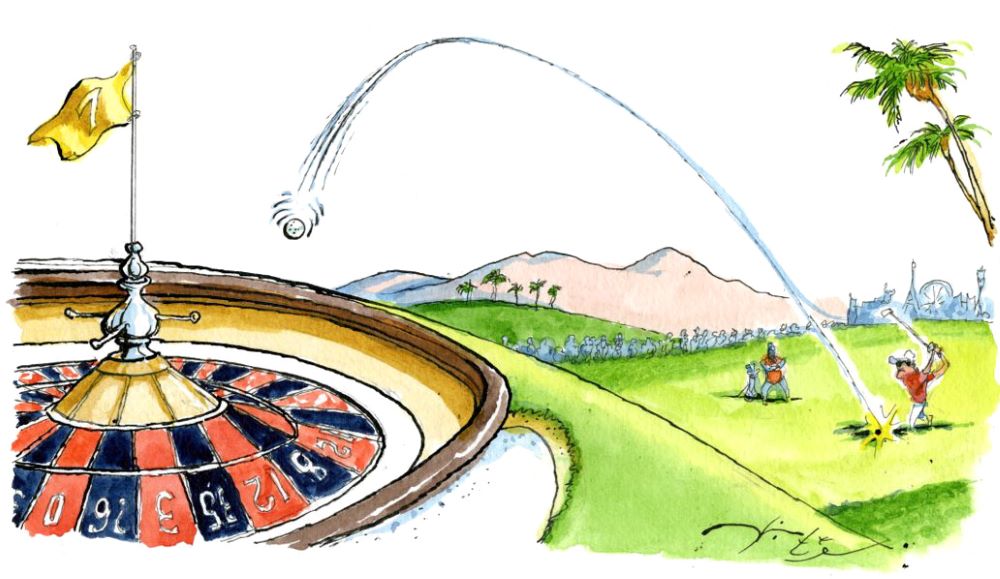The PGA Tour has a big opportunity with legalized gambling, but there’s also a potential downside
Sad truth: The Tiger Woods era is drawing to a close. Whether we like it or not, his competitive career will end soon, be it one year from now or five, and when that happens professional golf will experience a doldrums the likes of which it hasn’t seen since Bobby Jones retired 90 years ago. Herbert Warren Wind vividly described that era in The Story of American Golf: “Golf without Jones,” he wrote, was “like France without Paris—leaderless, lightless, and lonely.” And so it shall be without Woods. For the last quarter-century,
Tiger and Tiger alone has moved the needle, igniting and sustaining a fan fervor that launched tournament attendance, TV viewership, advertising revenue, and prize money to undreamed of levels. Half a century ago, 11-time winner Frank Beard estimated that 75 cents of every dollar he’d earned he owed to Arnold Palmer. Today’s Tour players—and just about everyone else associated with pro golf—owe a similar debt to Tiger Woods.

So the PGA Tour soon will face a grim reality and a major challenge. Granted, their coffers are far from bare, even after the ravages of COVID-19, and yes, they’ve recently struck a lucrative multi-year deal for television rights (thanks in large part to Tiger’s recent resurgence). But what happens the next time those rights come up for renewal and Tiger is off playing shuffleboard? They’ll need someone else—or something else—to move the needle.
And they may just have it: gambling.
Two years ago, the U.S. Supreme Court reversed a longstanding ban on sports gambling. Since that ruling, 18 states have voted to legalize betting with another 20-plus soon to jump in—and jumping along with them is the PGA Tour.
In the last few months, under a newly established Official Betting Operator program, the Tour has forged partnerships with a raft of companies—The Action Network, BetMGM, DraftKings, FanDuel, Genius Sports, IMG Arena, and PointsBet—essentially bookies—geared to establishing a platform for betting on pro golf. Anyone who has watched a tournament on TV recently will have noticed some of these names, not only in the advertising but as part of the programming, where betting odds on the top players are now posted.
But we’re not simply talking about betting on who might win the weekly events. A key element will be the Tour’s ShotLink system, which has compiled reams of data on every player’s propensities on every kind of shot. This data will be used to set and re-set odds—in real time—to entice bets on everything from whether Rory McIlroy will hit his next drive into the fairway to whether Justin Thomas will sink the right-to-left breaking 20-footer he’s facing.
With an estimated 1.2 million shots played on Tour each year, that’s a lot of chances to bet—and a ton of money to be made. Estimates have put the total sports betting market in the U.S. at $150 billion per year, and if pro golf can carve off even a tiny percentage of that, a huge payday looms, not just for the PGA Tour but also for the state governments and various gambling operatives such as the aforementioned partner companies.
But just as important to Tour Commissioner Jay Monahan and his troops is the capacity for gambling to stimulate engagement in the game. In recent years, fantasy-sports betting has driven huge gains in TV ratings for both the NFL and MLB, where millions of viewers have zero interest in which team wins but are laser-focused on how their individual fantasy-team players perform. In the same way, future golf telecasts can be expected to attract a new wave of fanatics, engaged not in the outcome of the tournaments but in the moment-to-moment thrill of single shots—bettors who will delight to see Rickie Fowler chunk a chip shot because they’d just used their smartphone to place a $10 bet at 100–1 odds that he’d miss the green.
Now, this may not be the healthiest form of fan involvement—and it will likely do absolutely nothing to bolster participation in golf, but then, curiously, neither did Tigermania. (Roughly the same number of people play golf in America today as in 1996 when Tiger joined the Tour.) But legalized gambling does seem to have the potential to keep the PGA Tour humming along very nicely.
The future also would seem to hold some big paydays for real people. Headlines were made recently by the wager of $45,000—at 75–1 odds—that Phil Mickelson would win the U.S. Open at Winged Foot. Had that happened, the payoff would have been $3,375,000 and the big winner would have been James Adducci, the same James Adducci who last year placed an even bigger bet. On the Tuesday of Masters week, Adducci, a 39-year-old from Wisconsin who had $25,000 of debt in student, home, and car loans, flew to Las Vegas and placed his very first sports bet: a whopping $85,000 on Tiger to win at odds of 14–1. A week later, he returned to Vegas where the William Hill Sports Book presented him a check for $1,275,000.
A feel-good story, to be sure. But the potential for that kind of payoff also brings some very dark prospects. I’m not saying other states will embrace golf gambling as flamboyantly as the Nevada bookies—there will likely be some sort of dollar limits on a single bet. But hey, when the human frailties of addiction and greed get together on a shiny new playground, stuff can happen.
I’m not talking about Tour players betting on themselves, i.e., Rickie Fowler chunking that chip on purpose to make a few thousand on the side. First of all, the Tour’s bylaws strictly prohibit such activity. Secondly, call me naïve but I think most of the players are either smart enough, honorable enough, or rich enough not to try something that nefarious.
No, I’m thinking of something darker. Consider two big differences between golf and arena sports such as football and baseball. Number one is the proximity of the gallery to the players, and number two is the absence of loud “white” noise. We’ve all watched telecasts punctuated by yahoos yelling “Baba Booey.” Consider what might happen if one of those liquored-up clowns has a big bet on the line.
The Tour currently deals with such incidents by escorting the offender off the course, but there’s no way to prevent such an incident from occurring—especially if the disturbance is caused not by a stumbling drunk with a $100 bet but a deadly serious shark with a lot to gain.
Let’s say there’s a professional gambler, a shady character, who has placed a big bet on a player to win The Players Championship and stands to reap a seven-figure payout if it happens. And let’s say his horse is now in the clubhouse with the winning score and just one player has a chance to tie him, if he can sink a three-foot putt on the final green. Shady, in order to protect his bet, has hired a stooge who is standing beside the green. As the player takes his putter back, Stooge fires a blast from an air horn.
The ball never hits the hole. Stooge goes to jail for a week and pays a $50,000 fine, a pittance compared to the fee he receives from Shady, who is the big winner. The big loser is golf.






